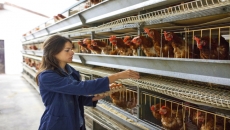The number of people in Canada killed by COVID-19 passed the 4,000 mark on Tuesday, as provinces eased anti-pandemic restrictions and the government announced new aid for farmers. The grim fatality milestone came as the country's two largest provinces each reported a jump in novel coronavirus-related deaths, although the overall increase in new cases was relatively modest. Canada has now seen 62,000 cases in every province and territory except Nunavut.
Although Ontario reported no new nursing home outbreaks, the number of long-term care deaths in the province passed 1,000, with another 31 residents dying. In all, 61 new deaths were reported, bringing the province's total to 1,361, according to latest government data.
The country's hardest-hit province, Quebec, also reported 118 new deaths, bringing its total to 2,398. Premier Francois Legault said about 11,200 health-care workers were off the job because of illness, vulnerability to COVID-19 infection, or fear of going to work.
After more than two weeks without any increase, New Brunswick recorded its first new case on Tuesday.
Despite the increases in cases and deaths, chief public health officer Dr. Theresa Tam said the signs were encouraging.
"Overall we are seeing a continual slowing down of the epidemic itself," Tam said.
In Ottawa, Prime Minister Justin Trudeau announced $252 million for an agri-food sector preparing for spring planting and dealing with sharply reduced meat-processing capacity. The Canadian Federation of Agriculture had called for urgent financial help — about $2.6 billion — to protect against food shortages, saying Ottawa had largely ignored a critical industry.
"Food security is a preoccupation for everyone," Trudeau said. "This is only an initial amount of support."
Part of the money, Trudeau said, will compensate farmers raising beef cattle or hogs who have had to keep their animals longer than planned due to reduced processing capacity. Trudeau also noted that disrupted supply and processing chains have led to an over-supply in areas such as dairy, poultry and potatoes.
"We've seen significant disruptions in global supply chains," Trudeau said. "Some producers have no choice but to throw out their product."
Trudeau called such a disposal a waste of effort and food. To help deal with the issue, he said Ottawa would spend $50 million as part of its farm strategy to buy large quantities of surplus product for distribution to people in need.
The prime minister's announcement came one day after the Cargill meat processing plant near High River, Alta., reopened after closing on April 20 as COVID-19 swept through the factory. More than 900 of Cargill's 2,000 workers have tested positive and one worker has died. Their union has asked the courts to stop work at the plant.
New data Tuesday showed almost 7.5 million people have received emergency federal aid that started flowing a month ago. The Canada Emergency Response Benefit provides up to $2,000 per month to anyone who lost a job, earns under $1,000, or whose job prospects have been affected by the pandemic.
Across the country, provinces have been taking tentative steps toward returning to normalcy by easing some of the stiff anti-pandemic stay-home and business closure directives. For example, Quebec has allowed retail stores outside Montreal to reopen, while seasonal businesses such as garden centres have restarted in Ontario. Other provinces are allowing some health services and limited outdoor activities to resume.
Most Canadians, it would appear, are largely happy with the pace of reopening the economy. A new poll by Leger and the Association for Canadian Studies suggests between 60 and 70 per cent of people supported the slow easing of measures, while 16 to 30 per cent indicated wanting to see things move even more slowly.
One consequence of the stay-home measures has been a sharp increase in people dying in fires, Ontario's fire marshal said. To date this year, fires have killed 51 people, a 65 per cent increase from last year. While it's not clear how many deaths might have been due to the increase in home cooking, the office did say unattended cooking is the leading cause of home fires.
-With files from Canadian Press reporters across the country.






